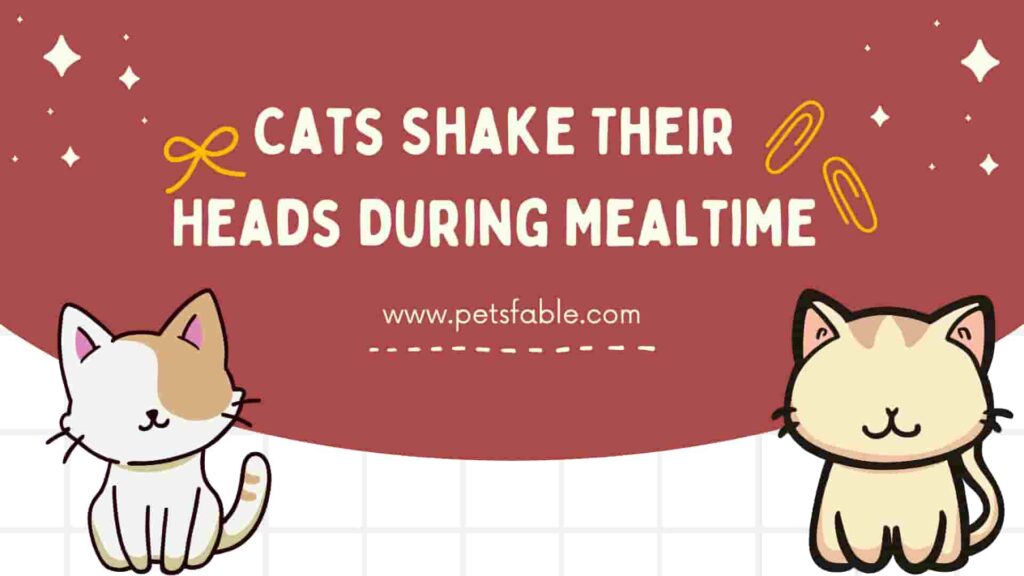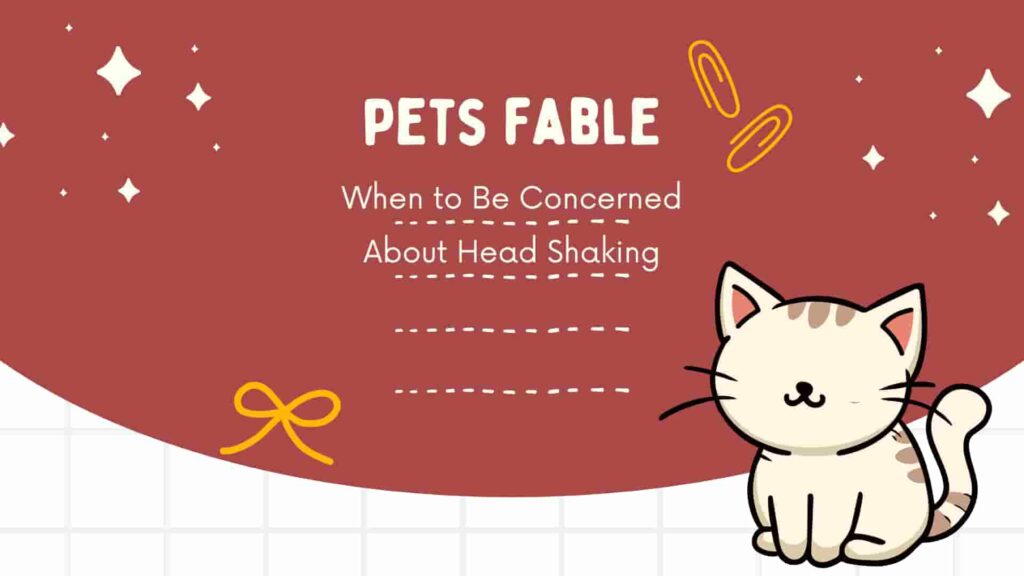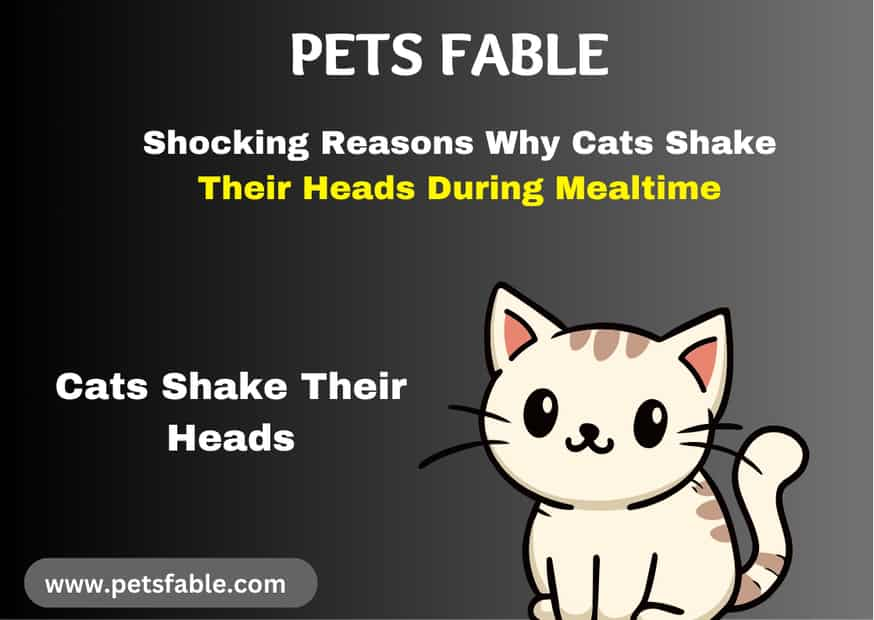Understanding the Behavior Cats Shake
Cats Shake may shake their heads while eating primarily due to discomfort from the texture or size of their food. Sharp or large pieces can irritate the sensitive areas of their mouths, prompting them to Cats Shake their heads to try to adjust or remove the irritating bits.
Health Considerations
Frequent head shaking during meals can also be a sign of underlying issues such as dental problems or ear infections. These conditions may cause discomfort or pain, making the cat shake its head more often, especially when chewing.
Monitoring and Care
Observing this behavior can be crucial for cat owners. It provides important clues about the cat’s health and comfort during meals.
If head shaking seems excessive or is accompanied by other signs of distress, it is advisable to consult a veterinarian to rule out health complications and ensure your cat’s well-being.

Unraveling the Mystery, Why Cats Shake Their Heads While Eating
Introduction to a Common Feline Behavior
Many cat owners have observed their pets shaking their heads vigorously during meals. This behavior, far from being just a quirky feline trait, is deeply rooted in their biology and health.
This article delves into the reasons behind this behavior, which might signal more than mere eccentricity.
Biological and Instinctual Causes
Cats possess a unique dental and oral structure that is optimized for their carnivorous diet, featuring sharp teeth and a rough tongue designed to tear and grasp food effectively.
This specialized anatomy can sometimes lead to discomfort when eating, especially if they encounter hard or awkwardly-sized food pieces.
Head shaking is often an instinctive attempt to dislodge uncomfortable food bits, ensuring they eat efficiently and avoid potential discomfort or injury.
Also read: 10-essential-things-to-know-before-frosting-dog
Health-Related Reasons Behind Head Shaking
While sometimes a benign behavior, frequent head shaking during meals could also indicate underlying health issues:
- Dental Problems: Issues such as tooth decay, gum disease, or dental abscesses can cause pain and discomfort, leading cats to shake their heads in an attempt to alleviate pain.
- Ear Infections: Conditions affecting the ears, which might cause discomfort or balance issues, can also lead cats to shake their heads. Signs of such issues include scratching at the ears, head tilting, or a noticeable loss of balance.
Signs to Monitor and When to Visit the Vet
If you notice your cat frequently shaking its head while eating, it’s important to observe for other symptoms that might indicate discomfort or health issues.
Symptoms such as pawing at the mouth or ears, reluctance to eat, bad breath, or swollen gums warrant a veterinary check-up to rule out dental problems or ear infections.
Understanding Why Cats Shake Their Heads While Eating
Impact of Diet on Head Shaking
Selecting appropriate cat food is vital for ensuring your pet’s comfort during meals. Here’s how different types of food might affect your cat:
- Dry Kibble: If kibble is too large or oddly shaped, it can be difficult for cats to chew, leading to head shaking. Ensuring the kibble size is suitable for your cat’s mouth can prevent discomfort.
- Wet Food: This type of food is generally softer and easier for cats to consume, which can reduce the occurrence of head shaking. Its softer texture allows for more comfortable chewing.
- Food Shape and Texture: Opt for food shapes that are easy for your cat to pick up and chew. The right texture and hardness should align with your cat’s dietary needs and dental health, enhancing eating comfort.
When to Be Concerned About Head Shaking
While occasional head shaking can be normal, persistent or vigorous head shaking may indicate a health issue. Signs to watch for include:
- Loss of appetite
- Vocalizing pain
- Excessive ear scratching
If you notice these symptoms, it’s advisable to consult with a veterinarian to discuss potential underlying problems like dental issues or ear infections. Early intervention can help address and prevent more serious complications.

Improving Your Cat’s Eating Experience
To make mealtime more enjoyable and stress-free for your cat, consider the following strategies:
- Use Shallow Bowls: Prevent whisker fatigue, which can be caused by deep bowls.
- Vary Food Textures: Smaller kibble sizes and softer food textures can make it easier for your cat to eat, reducing the need to shake their heads.
- Create a Calm Environment: A quiet and relaxed feeding area can help minimize stress and discomfort for your cat.
Regular health checks focusing on dental and ear health are also crucial in preventing conditions that might lead to discomfort and head shaking.
Head shaking in cats during meals can be influenced by several factors, ranging from the type of food to more serious health issues.
By paying close attention to your cat’s behavior and meal preferences, and making necessary adjustments, you can help ensure a happier and healthier eating experience for your pet.
If head shaking persists, seeking veterinary guidance is essential to address any possible health concerns effectively.
Also read: What-makes-tuxedo-cats-with–white-chests-so-unique
Join the Discussion: Understanding Your Cat’s Eating Behavior
We’ve delved into the intriguing reasons why cats might shake their heads while eating, highlighting everything from their unique anatomical features to potential health issues. Now, we want to hear from you!
We Encourage You to Share
- Your Cat’s Unique Eating Habits: What peculiar or distinctive eating behaviors does your cat display?
- Helpful Tips: Have you discovered any strategies that have enhanced your cat’s mealtime experience?
- Observations and Changes: Have you noticed any differences in your cat’s behavior after altering their diet or environment?
- Community Connection: Engage with other cat owners to exchange advice and stories. Your insights could be invaluable to our community of caring pet owners.
Your experiences and tips are not only welcomed but are crucial in building a knowledgeable and supportive community.
Please share your stories in the comments below or engage with us on social media to help enrich our collective understanding of cat behavior. Your feedback helps all of us become more informed and attentive cat lovers.
FAQ’s:
Is head Cats Shake an emergency?
While occasional head shaking in cats is normal, frequent or intense head shaking accompanied by other symptoms could signal a health issue, like an ear infection or neurological disorder. It’s important to monitor your cat and consult a veterinarian if such behaviors persist.
Do Cats Shake ear infections go away on their own?
Ear infections in cats typically do not resolve without treatment and can worsen if left unattended. A veterinarian’s assessment is necessary to properly diagnose and treat ear infections, often involving medications like antibiotics.
Why do kittens tremble when eating meat?
Kittens might tremble when trying new foods like meat, due to the excitement and the physical effort of chewing unfamiliar textures. However, persistent trembling in other contexts should be evaluated by a vet to rule out any health issues.
Why does my cat throw his head back when he eats?
This behavior, known as oral dysphagia, can be caused by dental problems, muscular issues, or neurological conditions affecting the mouth or throat. Observing this behavior warrants a veterinary visit to determine the underlying cause and appropriate treatment.
Why do cats shake their heads after you pet them?
Cats might Cats Shake their heads after being petted to signal discomfort or disapproval of the interaction. This “shake-off” behavior helps them express their feelings about certain touches or experiences.
What is fading kitten syndrome?
Fading kitten syndrome describes a condition in newborn kittens who show signs of failure to thrive, including weakness, isolation from siblings, and a high risk of mortality. Immediate veterinary intervention is crucial to address this serious condition.
Why do cats tilt their heads when you talk to them?
Cats often tilt their heads to enhance their auditory perception, helping them pinpoint the location and distance of sounds. This behavior is part of their natural instinct to assess their environment accurately.
Why do cats look at you while eating?
Cats may watch you while they eat out of curiosity about your food, or they might be seeking additional treats. This behavior demonstrates their interest in their surroundings and their bond with their owners.
Why do cats shake their heads when playing?
Head shaking during play is a natural behavior for cats, mimicking the motion they would use to capture or kill prey. This action helps them sharpen their hunting skills and provides mental and physical stimulation.
Cats Shake head not eating
If your cat is shaking its head and refusing to eat, it may be experiencing pain or discomfort from issues like dental problems or ear infections. Such behaviors should prompt a visit to the vet to identify and treat the underlying cause.
Cat shaking head but ears are clean
Even if a cat’s ears appear clean, head shaking can indicate problems like allergies, dental issues, or neurological conditions. Observing any discomfort associated with head shaking is important, as it may require professional diagnosis and treatment.
Summary
Understanding why cats shake their heads when they eat is crucial for ensuring their well-being. This behavior, often a sign of discomfort or an attempt to adjust to minor irritations, can sometimes be a symptom of more serious health issues.
By keeping an eye on additional signs and seeking veterinary advice when necessary, cat owners can ensure that their feline friends stay healthy and comfortable during their meal times.
